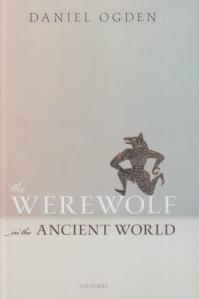 Among the classic monsters, the werewolf seems to suffer from lack of a foundational novel.Yes, vampires are older than Bram Stoker’s Dracula, and antecedents can be suggested for Mary Shelley’s Frankenstein, but there isn’t a werewolf novel of similar stature.Daniel Ogden, however, does us a service by providing an extended discussion of, as his title states, The Werewolf in the Ancient World.His survey is intriguing and informative, and also insightful.The werewolf is not always what it might seem.Ogden is an able guide through sources from antiquity through some medieval tales, focusing mainly on the ancient ones.He extensively explores their associations—witches, sorcerers, ghosts, and the like.And related tales of human transformation.He even suggests what some of those transformations may have been seeking.
Among the classic monsters, the werewolf seems to suffer from lack of a foundational novel.Yes, vampires are older than Bram Stoker’s Dracula, and antecedents can be suggested for Mary Shelley’s Frankenstein, but there isn’t a werewolf novel of similar stature.Daniel Ogden, however, does us a service by providing an extended discussion of, as his title states, The Werewolf in the Ancient World.His survey is intriguing and informative, and also insightful.The werewolf is not always what it might seem.Ogden is an able guide through sources from antiquity through some medieval tales, focusing mainly on the ancient ones.He extensively explores their associations—witches, sorcerers, ghosts, and the like.And related tales of human transformation.He even suggests what some of those transformations may have been seeking.
The werewolf is perhaps the most obvious monster that expresses repressed desire for transformation—a kind of salvation.Civilization comes with a cost and the werewolf is symbolic of the individual driven by animal desire, unrestrained by human convention.It’s also an idea of great antiquity.Although Ogden doesn’t go into it, stories of humans turned into wolves goes back at least to the Epic of Gilgamesh, one of the earliest pieces of literature we have in fairly complete form.The idea is attested in writers such as Plato and Augustine, if only to refute it.In other words, it is clearly something people have thought possible from very early times.Our long association with the wolf, and its domesticated version—the dog—certainly plays a psychological role in such tales.
As Ogden points out, Guy Endore’s novel The Werewolf of Paris, published in 1933, is perhaps as close as we come to a foundational novel.In the Universal monsters series that developed a canon for monster boomers, The Wolf Man was a somewhat late entry, appearing in 1941—a decade later than Dracula and Frankenstein.Despite these tardy cultural appearances, the werewolf has been part of our collective psyche far longer.Ogden shows that clearly.When you stop to rethink stories like Little Red Riding Hood, the talking, humanized wolf appears so naturally that we don’t often stop to consider the implications.I certainly hadn’t made the connection explicitly until reading it here.Ogden’s work is readable but academic, so be prepared for citations and some technical talk.Nevertheless, this is the clearest guide to lycanthropy and the magical ideas behind it from ancient times to have appeared in recent years.
